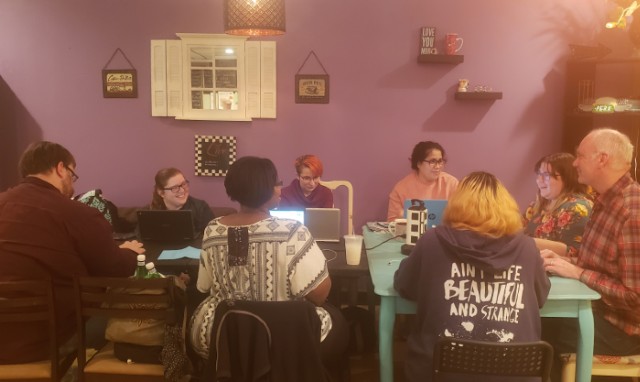
When someone asks me for my best piece of writing advice, I usually say, “Join a critique group.”
Since joining a writing critique group, my writing has improved by leaps and bounds. Critiques are an important part of my editing process because they help me figure out what really needs improving. But critiquing others is just as important for my writing process. I learn so much by reading other people’s work and listening to what other people say about the same pieces.
There is a lot to consider before joining a critique group, but this guide will tell you everything you need to know.
Critique Groups Versus Critique Partners
I’ll be the first to admit that having a group of writers read and critique your work is terrifying. I still get a little anxious when it’s my turn to be read. Many people prefer having a critique partner instead of a whole group for this reason.
In my critique group, Fiction Crafters, we all have different strengths and weaknesses. As a result, we all pick up on different areas for improvement. We joke that we need T-shirts that have our taglines on it. Mine would say, “More action beats!” One of my friends always asks about character motivation. My co-admin is the queen of showing instead of telling.
Likewise, it’s easy to see which issues need the most attention when more than one person mentions it. When only one person reads your work, they may see an issue where there isn’t one. When you have five out of six writers pointing out a problem, it’s definitely worth fixing.
Critique partners and critique groups are not a replacement for an editor. An editor is there to give you detailed feedback to fine-tune your manuscript, but they’re still just one person. I’ve written before on why I believe in delivering a polished manuscript to my editors. Critiques help you polish your work.

How Does It Work?
Every critique group will have a different process for critiques. I’ll explain a few ways that a critique group can be structured, but I’ll go into detail about my group.
Here is what you can expect from most groups:
- a word count limit
- a method for delivering critiques
- deadlines and time limits
My critique group meets every week. I know that is a commitment that might not be an option for many people, but it’s also my main social outlet. Currently, we have eight active members. We read two writers a week, who submit up to 5,000 words. The deadline to submit is Sunday night, and we meet on Wednesdays, so everyone has plenty of time to read.
We spend the first part of the evening socializing and eating. Each writer then gets forty-five minutes to be critiqued. We pass a talking stick and each person gets around four minutes to critique uninterrupted. Then the writer of the piece gets a chance to ask more questions or clarify things that the critiques brought up. The rest of the forty-five minutes is spent in open discussion about the work.
We submit through a shared Google Drive. Some of our members find it helpful to fill out a feedback form while others prefer to leave in-line comments.
Other groups might do all critiques online through a platform like Google Drive and never meet in person. I’ve also seen critique groups where you read your piece out loud and then you receive critiques. There’s no right or wrong way.
Maintaining Constructive Criticism
Like all groups, Fiction Crafters has had some growing pains. We’ve set up some guidelines to keep all feedback constructive and kind.
Types of Critiques
One of the things that has helped the most is classifying types of critiques. We used editing definitions for developmental, content, and line edits. Almost all critiques fall into these three categories. We ask that the author who is being critiqued specify what types of critique they want.
- Developmental edits: major plot and character issues.
- Content edits: more in-depth issues about plot, character, setting, pacing, etc.
- Line edits: phrasing, word choice, literary devices, etc.
These are our adaptations of widely-accepted editing definitions. You may have heard different terms for these. I think of these like an inverted pyramid. Developmental edits are the big issues, and the edits get narrower from there.
Why do we do this? We have found it makes our feedback more refined and helpful. If I’m submitting a first draft, I don’t necessarily need line edits. I may scrap the whole chapter! If this is a refined draft that has been through multiple rounds of edits, I’ve moved past most of my developmental issues.
We also limit proofreading critiques. Proofreading for spelling, grammar, and typographical errors is the last step for a manuscript because so much gets changed in early drafts. Between software like ProWritingAid and a professional proofreader, we don’t need to spend valuable critique time on comma mistakes. Offering a general feedback for repeated mistakes like “you might want to review the past perfect tense” or “look up comma splices” is fine, though.
Kind and Useful
Critiques should be two things: kind and useful. Strong negative language like “I hate this” or “this is terrible” should be avoided. It’s also not helpful to tell a writer that everything they did is perfect.
Indie author Rosalind Wulf taught our critique group some great tips for giving balanced critiques. She said that critiques should have meat, bones, and fat. Bones are concrete examples from the text.This makes sure that critiques are specific. Meat is the specific feedback about the text. Fat are the overall compliments.
Here’s an example from Rosalind. The fat is highlighted, the bones are underlined, and the meat is bolded.
- “I really loved this whole chapter. I feel like the early scene where your character has a breakdown really made your character likeable. The pacing of the last part of the chapter, where your other character is fighting the big bad, felt a little fast.”

How Do I Find a Critique Group?
Depending on where you live, there may already be established critique groups that you can join. Try searching Facebook, Meetup, or Eventbrite. If there are other types of writing groups in your area, connect with them. They might know of a critique group that is accepting members.
NaNoWriMo is a great way to meet other writers and find writing groups. That's how I found mine (pictured above). Go to write-ins in your region during November. That’s how my group got started! Also check the calendars at your local libraries and bookstores. Online critique groups are another option.
If you can’t find one that fits, start one!
Starting and Running a Critique Group
The first thing you need to decide is how often you want to meet. Weekly is a heavy commitment. Monthly is more realistic. But you can also meet biweekly, bimonthly, or quarterly. It’s really up to you.
You also need to decide where to meet. We have a reserved table at a local cafe. You can meet at someone’s house or at a library. Just make sure wherever you meet is big enough and quiet enough.
If you want to run an online critique group, there are several great ways to meet. You can meet through video conferencing with programs like Zoom or Google Hangouts. A Facebook group is another easy option for written critiques. Discord allows you to have voice calls or a chatroom. Slack is another great chatroom-style program.
Find other writers in your area. Go to writing events and book events. Ask around on social media. Do you want a large group open to anyone? Do you just want three close friends? How will you accept new members?
Learn from my mistakes: have clear rules in place and adapt as necessary. You’ll avoid hurt feelings from unkind and unhelpful critiques.
One of our biggest rules is “read to be read.” If you want to be critiqued, you must also make sure you are reading the other writers’ work on a regular basis. Don’t be that kid in a group project! Pull your weight!
Final Thoughts
Critique groups are invaluable for writers. If no one ever critiques our work, how do we improve? But I always say I learn even more from critiquing than being critiqued. I have learned what other writers notice when they read. We all bring in our own strengths and our own expertise. Critiques often turn into craft discussions, which benefit every writer in the group.
I challenge you to add critiques to your writing process. Your craft will grow in ways you didn’t know were possible.

